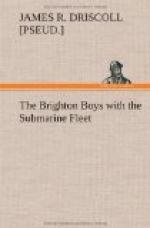“Your men need a bit of play after their hazardous experience,” was the message flashed to the Dewey from the Tallahassee’s commander as he bade “Little Mack” and his men Godspeed.
And so, after an uneventful run across the North Sea, the Dewey came back to England, bringing as her prize a monster U-boat of the latest design, complete in every detail and ready for service under the Stars and Stripes.
And with her came Jack Hammond—–a new American naval hero, whose deeds had fitted him for rank among the immortal list.
CHAPTER XX
THE MOTHER SHIP
News of the capture of the German U-boat had preceded the returning squadron and a great reception was accorded the American submarine and its gallant crew as it came to anchor again in the harbor at Chatham. Several American warships were at anchor with other units of the British and French fleets, and thousands of sailors lined the decks to cheer the plucky Dewey as it wended its way to its anchorage, accompanied by the destroyer Farragut, the latter towing the captive German submarine.
During the days that followed, Jack and Ted found themselves lionized wherever they went while on shore duty. News of the capture had spread throughout England and France, and the censors had permitted a generous account of the affair to be forwarded by cable to the United States.
Letters and messages reached the boys, but none that pleased them more, amid all the adulation heaped upon them, than a simple cablegram of a few words, forwarded from Brighton Academy that read: "Hearty congratulations. We knew you would make good, and we are proud of you.” “The Brighton Boys.”
Closer inspection of the captured U-boat by American and English naval officers proved it to be one of the very latest and improved types of German undersea craft. It was a vessel of a thousand tons displacement and more than three hundred feet long, capable of a surface speed of twenty knots an hour and propelled by twin engines of eight thousand horsepower. The hull was constructed of double steel—–virtually one hull within another—–and the space between hulls given over to the storage of fuel oil, thus increasing the cruising radius of the vessel by permitting the carrying of more fuel. The periscopes were of the telescopic variety that could be raised and lowered.
“What do you suppose they will do with our prize?” asked Jack one afternoon about a week after they had returned from their adventurous voyage. He was talking to “Little Mack,” who was supervising some repairs to the Dewey.
The submarine commander’s eyes twinkled. “I reckon they’ll turn her right in against the Germans,” was his reply.
“Do you suppose they will man her with a crew from the American fleet?” pursued Jack.
“Haven’t the least doubt of it,” answered his chief. “Some of my boys may be taken to fill up her crew and I wouldn’t be a bit surprised if they light on you.




